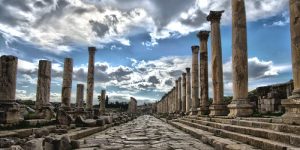
Robert Jewett succumbed to Covid-19 on December 4th. His students called him Dr. or Prof. Jewett while friends and colleagues just called him Bob, extraordinary Bob.
Jewett’s most monumental work was a massive volume titled Romans: A Commentary (2006). This 1140 page tome took him 25 years to research and write. Fortunate for us slow readers, he subsequently published Romans: A Short Commentary in 2013. Prof. Jewett – Bob – teaches us today through his fresh and relevant insights into the Apostle Paul’s most important epistle.
Surprisingly, Jewett pinpoints the heart of Romans in chapter 15, verse 7: “Welcome one another, therefore, just as Christ has welcomed you, for the glory of God.” The heart of the gospel is Christ’s welcome extended to each person. This divine act becomes a call to the church to welcome one another.
Rome’s extreme social division

Society also ascribed higher status to men than women, and children were often categorized with slaves (compare Galatians 4:1). The crowds praised philosophers and sophists who had high oratorical skills, but those who could not speak publicly using refined rhetoric or whose physique did not conform to classical standards were held in contempt. Listen to people’s critique of Paul: “His bodily presence is weak, and his speech contemptable.”
Ethnic divisions and tensions ran deep in ancient Roman society. People generally despised the Jews because they did not participate in civic religion and refused to offer sacrifices to a city’s patron deity or the Emperor in the imperial cult. The antipathy towards them could break out in violence (an example would be Acts 18:17). Jewish distain of Gentiles and their idolatry was strong. The “Barbarians,” ones who did not speak Latin, were the “others.” The rivalry between Jews and Samaritans is well known. Rabbi Eliezer said, “one who eats Samaritan bread is like one who eats pork” (John 4:9).
Jewett – Bob, that is – points out that we need to read Romans along the grain of ancient ethnic divisions. The Emperor Claudius banished the Jewish community from Rome in AD 49. Suetonius explained that “Since the Jews constantly made disturbances at the instigation of Chrestus, he expelled them from Rome” (“Chrestus” may be a mispronunciation of “Christos”; Acts 18:2).
After Claudius’ death in AD 54, the Jewish community, including Jewish Christians, began returning to Rome. Apparently, their reintegration into the church awakened old prejudices. Around this time, Paul wrote the Roman church to announce his forthcoming visit and intent to travel to Spain, populated at that time by those considered “Barbarians” (Romans 1:14; 15:24, 28). He wants the Roman church to assist him to reach those “others.” And he calls the church to remember that the gospel “is the power of God for salvation to everyone who has faith, to the Jew first and also to the Greek” (Romans 1:16). The heart of Romans is chapters 9 through 11 where Paul discusses God’s plan for both Jews and Gentiles. Christ’s welcome of all peoples, demonstrated through his life and in the cross, becomes the central exhortation for the life of the Roman church: “Welcome one another, therefore, just as Christ has welcomed you, for the glory of God” (15:7; 14:1).
Grace to all in equal measure
There was a lot to work out in this ethnically mixed congregation with all their prejudices and varied customs regarding eating or abstaining from certain foods and observing some days over others (Romans 14:1-15:13). But Paul calls them to “greet one another with a holy kiss” (16:16). Prof. Jewett summarizes what was at stake: “The gospel offered grace to every group in equal measure, shattering the imperial premise of exceptionalism in virtue and honor.”
We just said “Goodbye” to 2020, a year marked not only by the pandemic but also agonizing social tensions. We are a deeply divided nation along political lines that have made conversations even with family and church members difficult. Voting rights are on the line in many communities. Profound racial tensions have issued in protests and counter protests. Second Amendment rights play off against the need to control violence in our cities. While the stock market hits unprecedented highs, hunger and homelessness deepen because of job losses caused by the pandemic. Tensions around gender issues are a centerpiece of current culture wars. Although 2020 is past, the social divisions remain.
How does the church make its way through the extremely troubled and divided waters of our day? And how can our churches become a sign and agent for healing in American society? The “Roman Road” of salvation offers a vision of how people, commonly divided in society, come together because of Christ’s care for all. Paul’s call is to “welcome one another” since embrace instead of exclusion is the very heart of the gospel: “Christ welcomed you.”
Thank you, Bob, for reminding us about the relevance of Romans for our own fractured communities. In the end, soli Deo gloria.
 Dr. Gene L. Green is the Dean of Trinity International University – Florida
Dr. Gene L. Green is the Dean of Trinity International University – Florida
For more articles like this, visit goodnewsfl.org/topic/god/practical-application/

Comments